Twenty-five years ago we were received into the Orthodox Church
Twenty-five years ago today we were received into the Orthodox Church on the day of the Synaxis of the Archangel Michael and the other Bodiless Powers.
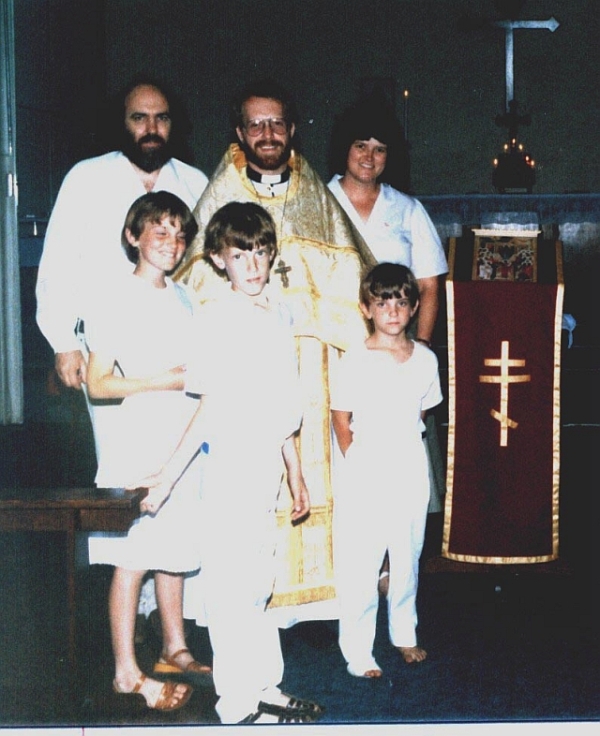
After being received into the Orthodox Church by Fr Chrysostom Frank, 8 November 1987: (Back) Methodius (Stephen) Hayes, Fr Chrysostom Frank, Katherine (Val) Hayes. (Front) Julia (Bridget) Hayes, Nicholas (Simon) Hayes, Raphael (Jethro) Hayes
We were received into the Orthodox Church in Johannesburg on 8 November 1987 (Michaelmas) by Fr Chrysostom Frank who had recently returned from the USA to be chaplain of the Society of St Nicholas of Japan, a newly-established Orthodox mission society.
At that time the Society was meeting at St Matthew’s Anglican Church Hall in Fairmount, Johannesburg, for Saturday Vespers and the Divine Liturgy on Sundays, and the Church of St Nicholas, which had its beginnings then, recently celebrated its own 25th anniversary.
Our road to Orthodoxy had been quite difficult, however.
I had first become interested in Orthodoxy when I was studying theology at St Chad’s College, Durham, England, and had the opportunity to attend a Seminar on Orthodox Theology for non-Orthodox theology students. It was held at the Chateau de Bossey in Switzerland, where we had a week of lectures, and then went by bus to Paris where we attended the Holy Week and Pascha Services at the St Sergius Institute in April 1968.
I was then Anglican, and the thing that got me hooked was the Easter Kiss. That was before the “kiss of peace” became fashionable in Anglican churches. At St Sergius the priest stood in front of the congregation and one of the other ministers kissed him with the greeting “Christ is risen” and the response “Indeed he is risen”, and the minister then stood on the priest’s right, and the next person greeted both of them, and so it went on until everyone had greeted everyone else. It took 45 minutes. And it was followed by the reading of the Paschal Homily of St John Chrysostom, which encapsulates the essence of the Gospel in less than one page of text.
That whetted my interest in Orthodox theology, and I began to read books of Orthodox theology. One of the first was The world as sacrament by Fr Alexander Schmemann, later published in an expanded version as
 For the Life of the World: Sacraments and Orthodoxy by Alexander Schmemann
For the Life of the World: Sacraments and Orthodoxy by Alexander Schmemann
My rating: 5 of 5 stars
If there is one book that would recommend to anyone wanting to know about the place of the Christian faith in the world we live in, this is it.
Back in the 1960s Western theologians were divided into those searching for the secular meaning of the gospel, and those who were seeking to respiritualise it. I found both equally rebarbative, and Schmemann articulated what I had been trying to say.
I returned to South Africa and remained an Anglican for another 15 years. I got involved in theological education, training self-supporting priests and deacons in the Anglican diocese of Zululand. Then I became Director of Mission and Evangelism in the Anglican Diocese of Pretoria, but that only made the theological problem more acute. An evangelist is one who proclaims the gospel, the good news of Jesus Christ. But in Western theology the tendency to argue about the gospel rather than proclaiming it seemed to be growing stronger. As St Paul said, in a somewhat different context, if the trumpet gives an uncertain sound, who will be prepared for the battle? (I Cor 14:8). It was becoming more and more apparent to me that the only place to find the orthodox theology that I believed in was in the Orthodox Church.
I wrote a letter to Fr Alexander Schmemann, since he had written the books that had convinced me, to ask his advice, but he had died a year or two before, and so my letter was passed on to a South African student at St Vladimir’s Seminary, Jonathan Proctor (now a priest in St Paul, Minnesota). He told me there was an English-speaking parish in Melrose, Johannesburg, with an English-speaking priest, Fr Chrysostom Frank.
We drove the 60 kilometres to the Sunday services, but could not afford to do so every Sunday, so on alternate Sundays we went to the Catholic Church in Queenswood, which was just 3 kilometres away, and was reputed to be one of the liveliest Catholic parishes in Pretoria, with lots of house churches and things like that. But though it was closer to home geographically, it felt less like home spiritually.
After a few weeks of this, we asked Fr Chrysostom what we should do to join the Orthodox Church. He said we should write a letter to the local bishop. So we did.
We waited for a reply from His Eminence Metropolitan Paul Lyngris, Archbishop of Johannesburg and Pretoria, but none came. Eventually Fr Chrysostom asked the bishop. Yes, he had received our letter, but there was a problem. A couple of months before we had arrived, another former Anglican priest had been received into the Orthodox Church in the same parish. He was Athanasius (David) Hamilton. The Archbishop was worried that the Anglicans might complain that the Orthodox was proselytising if we were received into the Orthodox Church, and so he had sent our letter to the Patriarch in Alexandria and asked for his advice. The Patriarch decided to refer it to the Holy Synod. This seemed a bit much. A synod of bishops from all over the continent discussing whether one family of five could join the Orthodox Church!
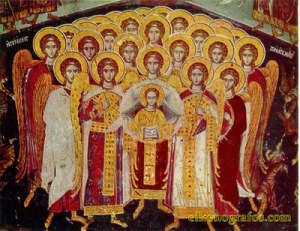 In the mean time, Fr Chrysostom went to study overseas, at the same St Vladimir’s Seminary, and the priest who replaced him could only speak Greek, and Pantanassa reverted to being a primarily Greek-speaking parish. Before the Holy Synod could meet to discuss our letter to ask if we could join the Orthodox Church, the Patriarch died, and so the Holy Synod was more concerned about arranging for the election of a new patriarch. What happened to our letter, we’ll probably never know. Perhaps in a century or three someone will find it mouldering in the archives in Alexandria.
In the mean time, Fr Chrysostom went to study overseas, at the same St Vladimir’s Seminary, and the priest who replaced him could only speak Greek, and Pantanassa reverted to being a primarily Greek-speaking parish. Before the Holy Synod could meet to discuss our letter to ask if we could join the Orthodox Church, the Patriarch died, and so the Holy Synod was more concerned about arranging for the election of a new patriarch. What happened to our letter, we’ll probably never know. Perhaps in a century or three someone will find it mouldering in the archives in Alexandria.
So for the next couple of years we were in a kind of ecclesiastical limbo, belonging nowhere. Many years latter Val and I confessed to each other that there had been times during those two years when we had contemplated going to the railway line over the road from our house and thowing ourselves under a passing train. Perhaps it was the holy guardian angels who protected us from that.
We still sometimes visited the local Roman Catholic Church of Christ the King in Queenswood. Once we asked the priest if we could talk to him, and he said “Phone me to make an appointment.”
One Sunday in Advent 1986 we went to Mass and they talked about “Shelter seeking” that evening, to which the congregation were invited, so Val went to ask the priest if we could go to it, even though we were not members, but we weren’t able to ask anything more about it because someone else started talking to him. We decided to go to it anyway. They had said that it would start at 7:30, but nothing seemed to happen, and there were just people hanging around outside the church talking. Then someone came and asked us if we were waiting for the Shelter Seeking, and when we said we were, they said the others had probably already left, and they would lead us, so we followed them to Sunnyside, and they were lost too, so we separated, and then found the house where they were doing the shelter seeking, but it was finished by the time we got there, and we were only in time for tea, so we never found out what shelter seeking actually was. At tea we got into conversation with someone, and thought perhaps that would be an “in” to this rather closed church community, but it turned out that it was his first time there too, and he had never found out what shelter seeking was either.
When the new Pope and Patriarch of Alexandria and All Africa (Parthenios III) was elected a group of us in Johannesburg and Pretoria approached him for his blessing to start a mission society, with Fr Chrysostom as chaplain, and he gave his blessing. Fr John Meyendorff, the Dean of St Vladimir’s Seminary, impressed on Fr Chrysostom that one of the first things he should do, on returning to South Africa, was to receive us into the Orthodox Church, since we had been waiting so long. We had expected some kind of catechumenate and teaching, but Fr Chrysostom said that could wait till afterwards, and so after all the waiting, in the end it was quite a rush.
Fr Chrysostom said we could have new saints names, and gave us a book of saints so that could choose some. The book seemed rather odd. I was surprised to discover that Lord Byron, the English poet and libertine, was an Orthodox “saint”.
I picked Methodius, because I was still interested in mission and was studying missiology, and he was a missionary saint. Val chose Katherine, because she was close to her birthday. Bridget chose Julia of Carthage, because she was far away from her birthday — with her birthday in January being so close to Christmas, she wanted an excuse to celebrate some other time of the year. Simon chose St Nicholas of Myra (not of Japan), and Jethro chose St Raphael, whose day it happened to be when we were chrismated.
When I was ordained as a deacon, however, the bishop gave me the name Stephen again, and that seemed appropriate, since he was one of the first deacons, and it seemed to be a sign that I should remain a deacon. When Bridget went to Greece to study, she found the name Julia very useful, since “Bridget” is a difficult name for Greeks (in Greek it looks something like “Mpridzet”). And a few years later, when Jethro was at school, his name Raphael was considered cool, since it belonged to one of the Teenage Mutant Ninja Turtles.
But our Slava is St Michael and all the Bodiless Powers of heaven. The Slava is the feast of the patron saint of the family, when the first members of the family were baptised. Some years we have been able to celebrate it fully, with guests, and with a priest coming to the house. Other years, just by a few prayers. It seems to be a custom worth preserving and encouraging in Africa, where for many people ancestors are important.
Troparion – Tone 4
Commanders of the heavenly hosts,
we who are unworthy beseech you,
by your prayers encompass us beneath the wings of your immaterial glory,
and faithfully preserve us who fall down and cry to you:
“Deliver us from all harm, for you are the commanders of the powers on high!”
Kontakion – Tone 2
Commanders of God’s armies and ministers of the divine glory,
princes of the bodiless angels and guides of mankind,
ask for what is good for us, and for great mercy,
supreme commanders of the Bodiless Hosts.
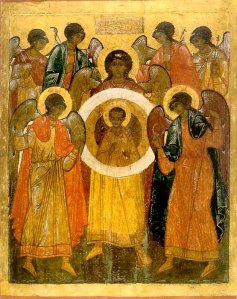
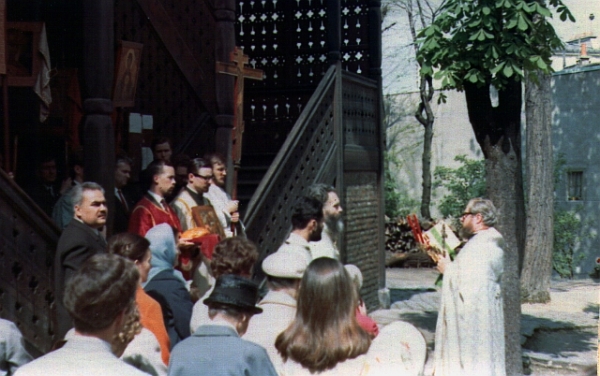
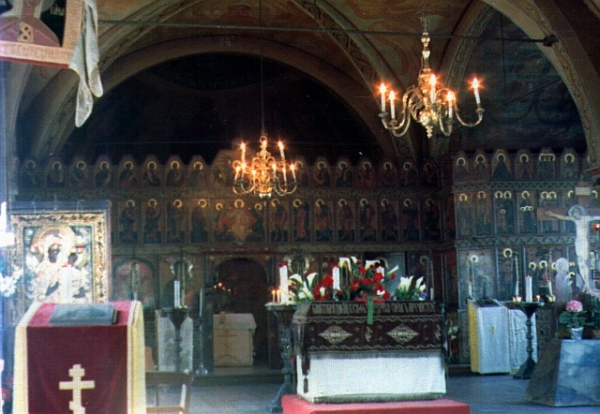
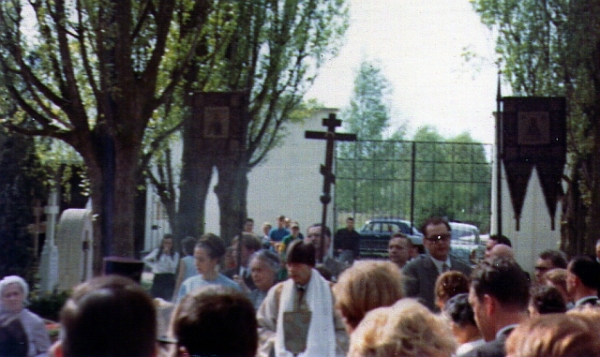



Thanks so much, Steve. This greatly helps me to fill in the ‘missing years’. I will try and track down ‘For the life of the world’.
Many years to your family! Today is our family’s Slava, too, 22 years behind you. 🙂 Julia’s iconography is beautiful!
Thanks, and many years! The photos of St Sergius bring back all sorts of memories for me, albeit decades later!
Took you and your family a while to get to the Orthodox church Steve! Thanks for the book recommendation.
do you articulate what the actual theological problem was?
Irulan, I thought i had said what the theological problem was — the tendency to argue about the gospel rather than proclaiming it. Perhaps that deserves another blog post on its own, but in Western Christianity I felt caught between those who wanted to update the gospel on the one hand, and those who wanted to defend it on the other.
Many years to the Hayes Family!
Steve, your blog writings helped me on my way into Orthodoxy, so St. Methodius is still helping you.
Dana
Much appreciated, Steve. Happy anniversary! (Nancy and I celebrate our 25th anniversary in the Orthodox Church this coming spring.)